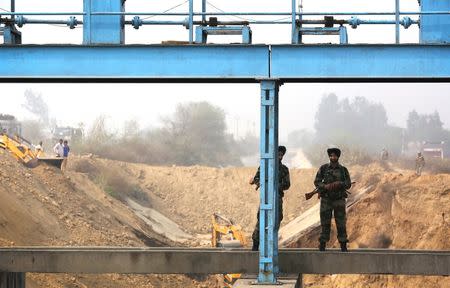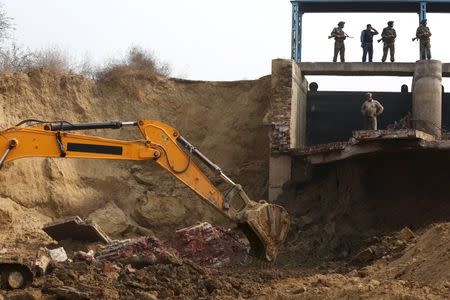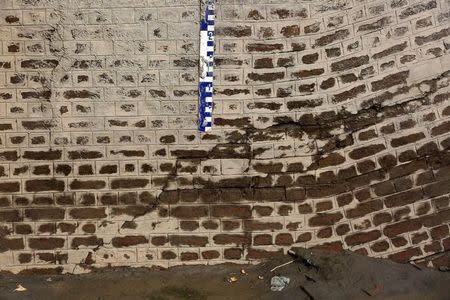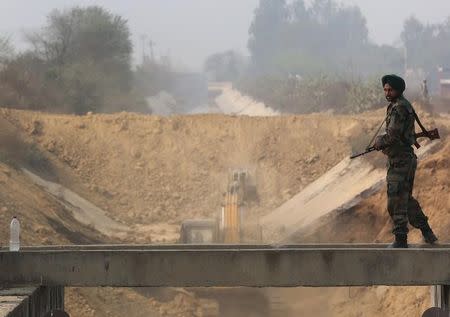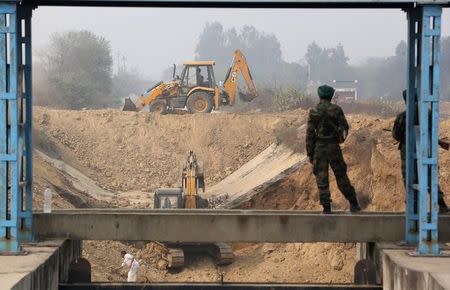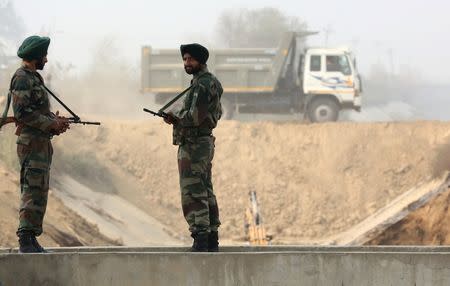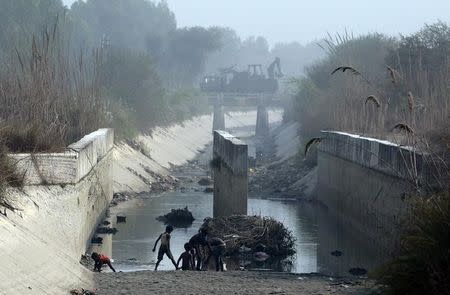With canal sabotage, rural protesters vent fury on Delhi
By Sankalp Phartiyal and Douglas Busvine GARHI BINDHROLI, India (Reuters) - Protesters venting their fury at economic injustice in the country's rural areas were targeting Delhi, a city of 20 million people, when they wrecked its main source of drinking water last week. As rioting and looting by the Jat rural caste spread across the neighbouring state of Haryana last Sunday, unidentified protesters took over a section of the Munak Canal and tore up its concrete bed with digging equipment. "They made a small hole, and the water damaged it more," Dhruv Shashwat, an engineer overseeing the repairs near the village of Garhi Bindhroli in Haryana, told Reuters amid a haze of dust and the din of jackhammers, generators and excavators. The fast-flowing water "cut down" the canal's banks, added Shashwat, who is supervising work by three mechanical diggers, a bulldozer and eight trucks, guarded by three shifts of 50 paramilitary troops. It will take around 15 days to complete the task of refilling the canal bed with earth and relining it with concrete, as well as fixing the damaged sluice gates nearby, said Shashwat, a state irrigation official. Of the 19 people killed during the agitation involving the Jats, who make up a quarter of Haryana's population of 25 million, two were shot dead when police dispersed protesters near the sluice gates on Feb. 19. A local government officer then issued an order to police not to shoot, Shashwat said, and a group returned two days later to sabotage the canal unhindered. The mob left untouched a bigger, parallel watercourse that irrigates farmers' fields as well as supplying the capital, but whose contents are only fit to drink after being mixed with clear Himalayan water from the damaged channel. A leader of the Jat community, which is demanding more jobs and college places, denied responsibility for the sabotage. "The government is accusing our boys of a crime we did not commit. They should arrest the perpetrators," said Ramesh Dalal, of the Jat Reservation Movement. "We regret the sabotage." WAR FOOTING Delhi's water minister, Kapil Mishra, told Reuters the repair work could be completed within 15 to 20 days "if we work on a war footing". Although the work is busy, the pace is hardly intense at the Munak Canal, about an hour's drive north of Delhi. To the untrained eye, it looks as though the wrecked canal - the two channels together supply three-fifths of Delhi's water - could be out of commission for longer. The attack could mark an opening shot in a wider conflict in which water, in scarce supply after two years of drought in India, could become a powerful weapon. It also reveals a lack of supply options in the vast and sprawling city that consumes 810 million gallons (3.7 billion litres) of water every day. "We're not going for city-level rainwater harvesting, we are not going for groundwater recharge, we are not preserving our lakes," said Sushmita Sengupta, a water expert at the Centre for Science and Environment in New Delhi. "Because there is mismanagement, the city is facing problems. To search for water you have gone far and far and far, which is not advisable." Disruptions have eased, but the worst-hit areas of Delhi are being supplied by tanker. A prolonged cut in supply to areas such as Dwarka that depend on the canal could fan concerns about sanitary conditions in poorer areas. In contrast with the misery for millions in Delhi, children living near the canal have found a new way to have some fun. They are playing in the knee-deep dregs in the canal, catching fish trapped there with their bare hands. (Additional reporting by Rupam Jain; Writing by Douglas Busvine; Editing by Clarence Fernandez)

